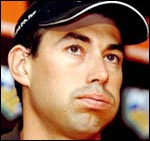Bold declarations
Daniel Laidlaw
Lose the first Test of a three-Test series and it is monumentally
difficult
to come back and win the series. Indeed, it has only happened on a handful
of occasions, which makes the bold declarations by captains Fleming and
Waugh in the first Australia-New Zealand Test all the more remarkable.
It is one thing to set the opposition an achievable target in pursuit of a
result once the series has already been won, as Adam Gilchrist did in the
fourth Test against England when Australia had an Ashes-winning 3-0 lead.
But to do it in the first Test of a short series, which has a large
bearing on the result of that series, is quite courageous.
Even though Australia
must still be heavily favoured to win the remaining two Tests, a loss in
the
first followed by possibly more rain in another drawn match would have
resulted in the loss of a world championship point and given more ground
to
impending rivals South Africa, presuming either side are paying attention
to
the standings.
Waugh says he would have set New Zealand a target anyway. But if New
Zealand
had managed to bat on longer and were not interested in chasing, the
intriguing last day would not have eventuated. As underdogs, New Zealand
had
less to lose by declaring, but a loss for either side would have invited
criticism of the approach. Perhaps that would have been the true test of
the
praise for it. In the end, the fact New Zealand got so close meant they
took
more out of the match than Australia.
 Such declarations happen all the time in domestic first-class cricket, but
it seems there has been a reluctance to make them at the highest level
because ‘this is Test cricket’, as if there is so much more attached to
winning and losing that it is somehow morally wrong to make a game out of
it
and entertain the spectators, an aspect often ignored but which both
Fleming
and Waugh spoke of.
Such declarations happen all the time in domestic first-class cricket, but
it seems there has been a reluctance to make them at the highest level
because ‘this is Test cricket’, as if there is so much more attached to
winning and losing that it is somehow morally wrong to make a game out of
it
and entertain the spectators, an aspect often ignored but which both
Fleming
and Waugh spoke of.
It is true that a result under those circumstances is contrived because
the
match has not followed its natural course of events, which in a way does
devalue the outcome. Is it not so different, though, from the early days
of
Test cricket on uncovered pitches when rain could also have a massive
impact
on the fortunes of a team? In both cases, the natural outcome of the match
has been altered by the weather, it's just that in this instance the
captains have responded to the circumstances by taking matters into their
own hands. Whereas Test cricket used to have terminology like “slippery
wicket” and “sticky wicket” to describe pitches affected by rain, now
rain-hit matches can be associated with terms like “limited-overs game” or
“declaration victories”.
Of course, the match-fixing revelations put declaration-inspired results
in
a new light. The most infamous one was the fifth Test of South Africa’s
‘99/
’00 series against England, when Hansie Cronje forfeited South Africa’s
second innings in a highly contrived match England ultimately won by 2
wickets. For a conservative captain like Cronje we now know such a radical
step was suspicious. For progressive leaders like Fleming and Waugh who
see
draws as pointless, it’s safe to say their motives were pure, although
nothing can ever be assumed anymore.
Behind the captivating last-day action – when an amazing 459 runs were
scored – was the rest of a Test match, one which saw some positive and
negative occurrences for both sides. For the home team, Brett Lee returned
to normal service after the first form setback of his international career
during the Ashes. Then, after returning from injury, it seemed like he
tried
to bowl too fast and consequently was wayward, but on the bouncier Gabba
pitch it appeared he was back to bowling with a rhythm from which
150kmp/h+
pace will surely come. Back on track, he should only improve.
With New Zealand needing 20 off 12 to win, Lee was trusted to bowl the
penultimate over ahead of Warne and Gillespie and had Cairns caught at
long
on to end the Kiwis' victory aspirations. When a match was in the balance,
Shane Warne used to be the one bowler Australia would turn to above all
others. Worryingly, that is no longer the case. Warne did take three
wickets, including Astle to break a 100-run partnership, but saw Cairns
and
McMillan blaze 17 runs from what was his final, almost match-losing, over.
It revived memories of the last day of the third Test in India, when the
rate of runs scored off him meant he could not be trusted to bowl in the
dying stages.
 For New Zealand, Chris Cairns made a bid to be considered ahead of Pollock
and Kallis as the world’s premiere all-rounder. Unquestionably New
Zealand’s
best player, he took 6 of the 10 Australian wickets to fall to bowlers,
helped New Zealand avoid the follow on by scoring a rapid 61 in the first
innings and then almost won the match in the second innings with 43.
Initially believed by the Australians to be mentally frail, Cairns made an
impressive impact on the ‘99/’00 series in New Zealand and is doing so
again
here. He bowls with heart and is an imposing presence at the crease,
especially the way he faces up to Warne. At present, Australia is
struggling
to find a way to even contain him.
For New Zealand, Chris Cairns made a bid to be considered ahead of Pollock
and Kallis as the world’s premiere all-rounder. Unquestionably New
Zealand’s
best player, he took 6 of the 10 Australian wickets to fall to bowlers,
helped New Zealand avoid the follow on by scoring a rapid 61 in the first
innings and then almost won the match in the second innings with 43.
Initially believed by the Australians to be mentally frail, Cairns made an
impressive impact on the ‘99/’00 series in New Zealand and is doing so
again
here. He bowls with heart and is an imposing presence at the crease,
especially the way he faces up to Warne. At present, Australia is
struggling
to find a way to even contain him.
On the negative side, New Zealand’s specialist support bowling is
threadbare, as had been suspected. O’Connor, Nash and Vettori took 0/225
between them in Australia’s first innings before O’Connor injured his knee
and Nash suffered an abdominal strain that ruled him out of the rest of
the
tour. It is unlikely Australia’s middle order will continue to succumb to
McMillan, so finding solid pace support Cairns is a matter of priority in
the remaining Tests, otherwise there should be more partnerships like the
224-run union between openers Hayden and Langer.
At first glance, Hayden and Langer are an unlikely pairing, as they are
both
left-handed and one is relatively new to the position. Yet presently they
are successful, with a century and double century partnership from two
innings together. It is impossible to say how long it will last, as
Australia could just as easily have been 1/0 were it not for an umpiring
mistake. With productive openers a rarity around the world, though, all
Australia can do is enjoy the prosperity while it lasts.
New Zealand has also found a surprisingly effective opener in Mark
Richardson. Apparently he doesn’t believe in footwork, which one would
think
would be a fatal mistake against McGrath and Gillespie, yet he has driven
well and so far outperformed top-order team-mates Bell and Sinclair. To
prevent more starts like 4/55 in the first innings, he’ll need to sustain
it.
More Columns
Mail Daniel Laidlaw